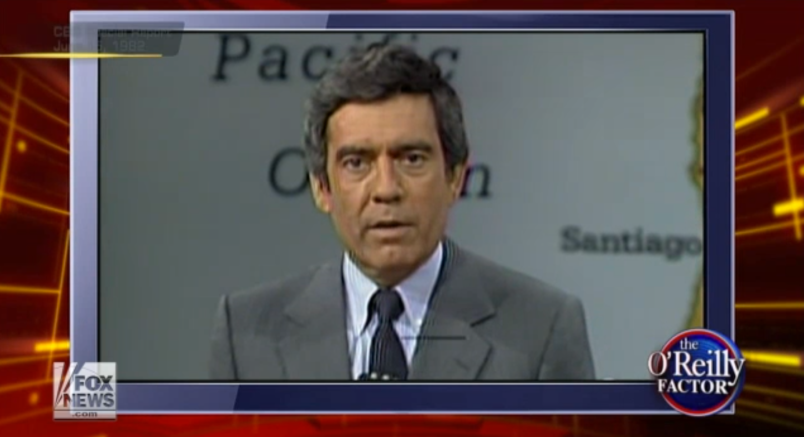Bill O’Reilly on Monday night’s episode of “The O’Reilly Factor” aired 1982 footage of protests in Argentina, in response to what he described as the charges of “left-wing zealots” who have accused him of embellishing his stories about covering the Falklands War for CBS News.
The footage was a compilation of several reports about protests in Buenos Aires at the conclusion of the war, which O’Reilly covered for CBS at the time. Mother Jones magazine published an article last week questioning things O’Reilly has said or written about his assignments there in the decades since.
“As I reported accurately, the violence was horrific,” the Fox host said on Monday night before rolling the clip.
The footage itself showed protests as Argentines demonstrated against their government for failing to take the Falkland Islands from the British. The footage depicted civilians throwing coins and garbage at the soldiers dispatched by the Argentine military junta.
CBS anchor Dan Rather introduced one of the reports, which was narrated by Eric Engberg, a correspondent for the network at the time who more recently has called O’Reilly “completely nutty” and repeatedly disputed the Fox host’s account of the protests.
“There were arrests and beatings,” Engberg said on the tape, as footage of the protests showed soldiers marching and pushing civilians. “Then with guns that fired tear gas and plastic bullets, the police opened fire.”
In an interview with Hamptons TV in 2009, O’Reilly said the military used “real bullets.”
“Here in the United States we would do tear gas and rubber bullets, they were doin’ real bullets,” O’Reilly said. “They were just gunning people down, shooting them down in the street.”
Mother Jones, in its article last week, noted that multiple news outlets, including the New York Times, had reported at the time that tear gas and rubber bullets were used but made no mention of real bullets or fatalities.
Another one of the things Mother Jones questioned was O’Reilly’s tale that he once rescued his injured cameraman while they were both being chased by the Argentine military.
The footage mentioned “several” television crews facing violence, but a CBS crew was not among those mentioned.
“Several North American television crews were jostled. A Canadian crew found their car surrounded by demonstrators who kicked and rocked it,” CBS correspondent Bob Schieffer said in one of the reports. “An ABC camera team’s car was stoned before the crew escaped.”
O’Reilly played on-air about two minutes of the footage released by CBS. (He made the longer footage available on his website.)
Moving on to his two guests to discuss the accuracy of his reporting: Don Browne, a former Miami bureau chief for NBC News; and Mediate columnist Joe Concha.
After discussing the general facts about the Falklands War with Browne, O’Reilly addressed the issue of his previous claims that he witnessed fatalities.
“It was extremely violent from the street where I was,” O’Reilly said, “and we couldn’t get casualty numbers because, as you know, it was a military dictatorship and they don’t give that to you.”
“We have not been able to say how many, alright? But I believe there were,” O’Reilly added.
Browne said that the situation was volatile, and said that any situation where the police and protestors clash is a “dangerous cocktail.”
“Nobody said it was a walk in the park, did they Mr. Browne?” O’Reilly said.
“Not at all,” Browne answered. “This was a very serious situation where a lot of people died.”
“A lot of people died,” said O’Reilly, nodding his head. “You bet.”
“On both sides, both the British and the Argentines,” Browne said, appearing to reference the broader war rather than the protests.
“Nine hundred deaths on the Island,” O’Reilly said. “And we don’t know how many in Buenos Aires.”
Browne spent 10 years at CBS before becoming NBC’s Miami bureau chief in 1979. He was profiled by Adweek in 2011, detailing his career after leaving that post.
From the Adweek profile:
In 1989 he was named executive news director, where he was the executive in charge of “Today,” and in 1991 became executive VP of NBC News. While at NBC News he also oversaw the creation of the primetime newsmagazine “Dateline.” He would go on to become president and GM of NBC’s Miami station, WTVJ, before joining Telemundo.
Watch the complete video provided by CBS:
This post has been updated.







O’Reilly is so caught up in his own bravado that the fails to see the disconnect between his statement that people were killed and the fact that they couldn’t get that information out of the military dictatorship. So which is it Bill … either you couldn’t get the information or people were killed (which you stated as fact)? And that, ladies and gentlemen is the least of his “mis-speaks.”
Billo Lied.
Nobody died.
He’ll fight this forever and a day.
Clearly O’Reilly was thwacked by the head end of an errant fox stole, a London Fog belt buckle or a flying peso.
That footage didn’t look any worse than the average sports riot you get about a hundred times a year in the US.
Mother Jones has video of him lying about the riot/protest in an interview.
https://www.youtube.com/watch?v=EFMpfy898xM